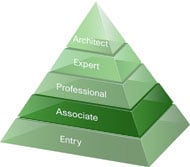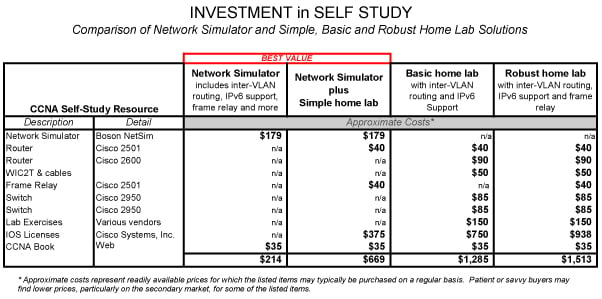By Kevin Harris
 Real equipment and/or network simulator
Real equipment and/or network simulator
Self-studying for the CCNA certification can be a daunting task. The amount of information a CCNA candidate is required to know and the skills that candidate is required to possess are quite extensive. Where to start?
Step number one is to determine which resources you will use. You will want to get a book to provide a good understanding of the concepts required for the CCNA and to give yourself a good source of reference. Major publishers, such as McGraw-Hill, Sybex, and Cisco Press, all have quality books covering the CCNA. Head to the bookstore and see which you like best. The next step is the big one. How do you get the practical, hands-on knowledge of routing and switching to build on the theoretical knowledge you got from your book? In the self-study arena, there are two primary options: acquire real equipment or purchase a network simulator. (NOTE: Many people will also argue that router emulators are a third option. While many choose that option, it is a violation of Cisco’s license agreement to run their IOS on anything other than the hardware it is licensed for. Accordingly, I don’t recommend or discuss this option since it requires a copyright violation and is illegal. Just because you or I don’t agree with Cisco’s licensing model doesn’t make it OK to steal from them.) Let’s compare the advantages and disadvantages of each option.
Obviously, real equipment gives you the ability to practice on actual routers and switches. I don’t think anyone would argue that, given the access, this is the most ideal solution. So…that’s the end of the story, right? Well maybe, but there are some things to consider. For instance, Cisco’s official labs call for at least a couple 2811 routers and a couple 2960 switches. Buy these new and it’ll run you about $5,200, or check eBay and you can probably get by for around $2,000 (before you pay for the IOS licenses). At these prices, how does anyone afford to study on real equipment in a home lab?
The answer, of course, is to build a home lab from older, outdated equipment that can be found much cheaper on the secondary market. (NOTE: Keep in mind Cisco’s pesky licensing model. While your used hardware may have an IOS image on it, you are not legal to use it without paying a license fee to Cisco. You may have noted that most vendors selling Cisco lab kits make it a point to mention that licensing is YOUR problem and not theirs. There is a reason for this.) A couple of older 2500 or 2600 series routers and a couple of 2950 switches would fit the bill here. Keep in mind that the CCNA is testing IOS 12.4 and most of these routers have a max IOS of 12.3. That is not a huge deal, but there is some limitation. You would ideally want to make sure that your router and IOS will allow inter-VLAN routing. It would be a good idea to consult the Cisco Feature Navigator to determine which versions of IOS are required to support the features you need on your hardware. A 2501, a 2600, and two 2950s give you a pretty functional home lab for around $350–$400 before you add any IOS license fees (around $150–$225 per device). Pick up an extra 2501 to use as a frame relay switch and you’re really rockin’!
Now that you have your lab set up, what are you going to do with it? You will need to source a set of lab exercises. Obviously, you want to find lab exercises that were created with the same objective that you have—passing the CCNA exam. Unfortunately, Cisco does not make their official labs available to the general public. The only way to get them is to take a course with a Cisco partner. Go to the internet and you can source labs from a number of places and many are even free. However, you should be wary here. Cheap or free lab content may be good, but it's usually worth what you paid. Keep in mind that Cisco charges around $225 each for their ICND1 and ICND2 lab books. While these may be a little pricey, it is a good point of comparison when searching for lab content. If someone is willing to give it to you, they probably haven’t spent much time on it. You want labs that are well written and generally error free. You also want them to comprehensively cover the objectives for the CCNA exam, start to finish. A good lab found free on the forums is great, but you are going to want more than that as you progress in your studies. I certainly haven’t seen all of the options out there, but I have seen many. I can’t make a recommendation other than caveat emptor. Better to look for value (quality, service and price) rather than jump on the cheapest option.
 Now that we’ve gone over the work involved with and expense required for setting up a home lab and putting our hands on a decent set of lab exercises, let’s shift gears and look at our other option—the network simulator. The network simulator can be an excellent tool in preparing for CCNA and CCNP exams. When going the simulator route, you want a network simulator that actually simulates the behavior of a network and not one that just spits out pre-programmed responses to expected command inputs. We’ll focus on Boson’s NetSim network simulator since that is what I know best. Boson’s NetSim actually creates and routes virtual packets and switches virtual frames through the simulated network. Aside from physically plugging in the cables and listening to the fan noise, your experience with the simulated network will be much the same as your experience with the lab kit we just built. Priced at $179, Boson's Netsim for CCNA network simulator compares very favorably to the cost of purchasing used hardware and third-party lab books.
Now that we’ve gone over the work involved with and expense required for setting up a home lab and putting our hands on a decent set of lab exercises, let’s shift gears and look at our other option—the network simulator. The network simulator can be an excellent tool in preparing for CCNA and CCNP exams. When going the simulator route, you want a network simulator that actually simulates the behavior of a network and not one that just spits out pre-programmed responses to expected command inputs. We’ll focus on Boson’s NetSim network simulator since that is what I know best. Boson’s NetSim actually creates and routes virtual packets and switches virtual frames through the simulated network. Aside from physically plugging in the cables and listening to the fan noise, your experience with the simulated network will be much the same as your experience with the lab kit we just built. Priced at $179, Boson's Netsim for CCNA network simulator compares very favorably to the cost of purchasing used hardware and third-party lab books.
Now, obviously a network simulator cannot be all things to all people. If you want to buy a CCNA-level network simulator to help with CCNP or CCIE studies, you will be disappointed. Network simulators can’t and don’t include the full functionality of Cisco’s IOS. The biggest knock I see on simulators is the “it doesn’t do this” or “doesn’t do that” complaint. Odds are this and that are not covered by the CCNA exam and, therefore, aren’t really applicable to the focused studies necessary to be successful. Boson NetSim for CCNA contains the functionality necessary to run all of the official labs published by Cisco for ICND1 and ICND2 with the exception of one or two debug commands.
Boson’s network simulator already contains lab documents covering the objectives of the ICND1 and ICND2 exams. This eliminates one of the headaches we had when putting together our kit earlier. We don’t have to worry about quality content, because we know that the NetSim labs have been used to successfully train thousands of CCNAs via self-study, ILT, and college/university courses.
One of the best features of NetSim is that you will not be limited to a two-router, two-switch topology. In NetSim, you can build any topology needed for the CCNA and beyond. You can also custom-build networks and load your own custom labs right into the application. When working through the labs in the network simulator, you can interact with the virtual devices via the very same telnet window that you would use to interact with actual devices and you can use the same shortcut commands. As a hands-on training tool, NetSim is very faithful to what you would experience with our home lab above.
At the end of the day, there is no right or wrong answer to the question of which method to use to get your hands-on training. At some level, there is no substitute for dealing with real equipment, plugging in the cables, watching the behavior when you make a mistake. No simulator can provide that tactile feedback. Additionally, with real routers and switches, your IOS functionality is only limited by which devices you are able to purchase and which IOS version they can run. With the network simulator, the available IOS commands and functionality are limited to the level of your studies. On the flip side, the network simulator is not limited by hardware type or IOS version (or Cisco’s IOS licensing model). You will get the functionality needed without worrying about “Buy It Now” prices. The network simulator also provides quality lab exercises that you may or may not get otherwise. It also does not limit the number of devices you can include in your network. The network simulator eliminates storage and power issues and is portable. Anywhere your laptop can go, you can have a virtual rack of gear at your disposal. One final benefit of the network simulator is that you can be up and running almost instantly for $179, quite a bit less than a credible hardware solution.
Study methods can be as unique as the individual. Maybe the lab we built is the right thing for you, maybe the flexibility of the network simulator fits your needs better, or maybe a network simulator along with a couple of 2500 series routers will give you the best of both worlds (apologies to Hannah Montana). Whatever method you choose, I wish you good luck in your studies.



